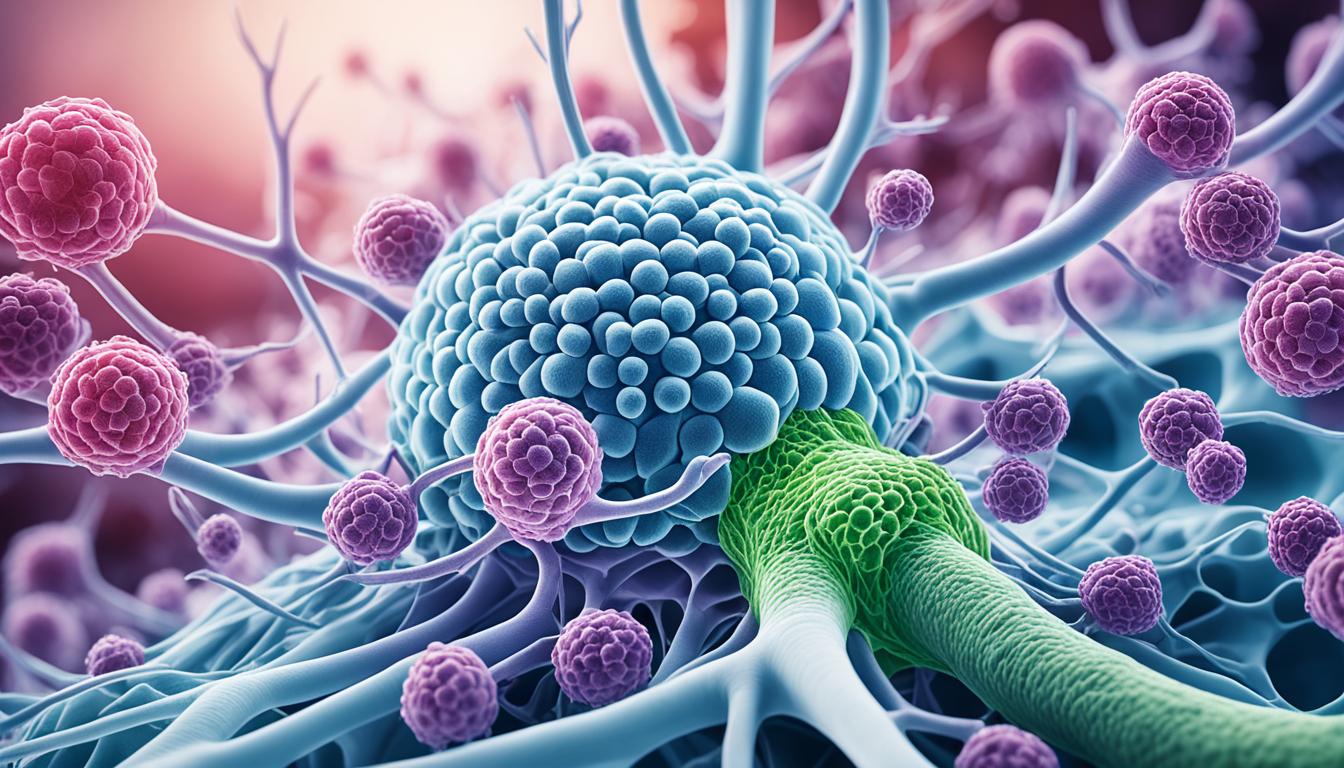Nasopharyngeal carcinoma (NPC) is a rare cancer type in the head and neck area. It starts in the top part of the throat, the nasopharynx. This cancer is closely linked to the Epstein-Barr virus but not all who have the virus will get NPC. Eating too much salt-cured fish and meat, smoking, drinking, and contact with specific chemicals are also risk factors.
Symptoms of NPC might seem common, like neck lumps or hearing issues. They could also involve nasal blockage and problems with certain nerves. Since these warning signs are not specific to NPC, diagnosing the disease early can be hard. Mistaking it for something else is common, which delays the start of treatment. Catching NPC early is key to fighting it successfully.
To diagnose NPC, a doctor will check your ears, nose, and throat thoroughly. They will also feel your neck for any lumps. A nasopharyngoscopy may be done next. This test uses a thin, lit tube to look into the nasopharynx for any unusual signs. After that, a small tissue sample, a biopsy, is taken to confirm NPC. CT scans and MRIs are used to see if the cancer has spread.
The best way to treat NPC depends on many things, like how big the cancer is and the patient’s general health. Treatment often involves radiating therapy, chemo, and sometimes surgery. Drugs that target certain cancer growth elements could be used too. Palliative care helps to ease symptoms and make patients more comfortable.
Doctors are also looking into stem cell therapy as a possible NPC treatment. Stem cells can change into different cell types. This could help repair damaged tissues and better people’s health outcomes.
Key Takeaways:
- Nasopharyngeal carcinoma (NPC) is a rare cancer type that begins in the nasopharynx.
- Risk factors include EBV infection, a diet high in salt-cured items, and habits like smoking.
- Symptoms are not always clear and may include neck lumps or issues with hearing.
- Diagnosis includes a thorough check-up, a nasopharyngoscopy, a biopsy, and various scans.
- Treatments consist of radiation, chemotherapy, surgery, and newer medications, as well as easing symptoms for comfort.
- Investigation into stem cell treatment for NPC is ongoing.
Risk Factors and Diagnosis of Nasopharyngeal Carcinoma
Nasopharyngeal carcinoma (NPC) is a type of head and neck cancer. It’s closely tied to Epstein-Barr virus (EBV) infection. Researchers are still figuring out the exact connection. But they know several other factors that can increase your risk. These include a diet heavy on salt-cured fish and meat, smoking, drinking, and being around chemicals like formaldehyde.
The signs of NPC might not clearly point to this cancer. Some common ones are lumps in your neck, loss of hearing, trouble breathing through your nose, and issues with your cranial nerves. Yet, these signs can also show up with other health problems. That’s why getting the right diagnosis is very important.
Diagnosing NPC calls for a thorough check-up of your body. This includes feeling your neck to look for any unusual lumps. Doctors might also use a nasopharyngoscopy. It lets them see the nasopharynx, the area toward the back of your nose, with a lighted, flexible tube. This helps check for any abnormal growths or signs of bleeding. Plus, a biopsy where they take a small tissue sample is often needed to confirm NPC.
Imaging tests like CT scans and MRIs are also used. These tests provide more info about the cancer’s size and if it’s spread to other areas. The results help doctors know the stage of the cancer. This is key for planning the best treatment.
Treatment Options and Prognosis of Nasopharyngeal Carcinoma
The treatment for nasopharyngeal carcinoma (NPC) depends on many things. This includes where the tumor is and how advanced it is. The patient’s health also matters. Common treatments are radiation therapy, chemotherapy, and surgery, among others.
Radiation therapy uses X-rays to kill cancer cells in the throat area. This can stop the cancer from growing and spreading. Chemotherapy means getting strong drugs to fight the cancer throughout the body. Surgery to remove the tumor is an option but is not done as often due to its challenging location.
Monoclonal antibodies in biologic drugs aim at the molecules that help cancer cells grow. Palliative therapy helps reduce symptoms for a better life with NPC. Stem cell therapy is also being looked at as a new way to treat NPC.
The outlook for NPC changes based on cancer stage and how well the treatments work. Finding the cancer early and treating it quickly can lead to a better result. It’s key to regularly see the medical team for check-ups and any needed changes to the treatment.

